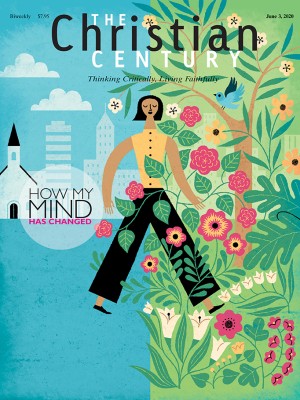How can we begin to untangle ourselves from the demands of whiteness?
Being open to changes of mind and heart is a necessary first step.

The February killing of black jogger Ahmaud Arbery by two white men in Georgia stands in a long line of similar killings, most of which go unnoticed outside their communities. “There seem to be some inherent dangers to living life as a person of color in the United States,” writes Dorothy Sanders Wells in this issue (“Ahmaud Arbery's lynching begs America to respond”).
While those dangers may have originated in an era “when it was legal for black people to be disciplined, lynched, reminded that we occupy a lower place in society,” Wells continues, they weren’t defeated by the legal changes of the civil rights era. It is still dangerous, and sometimes deadly, to be black in America. What will it take, Wells asks us to consider, for us to view our neighbors as bearers of God’s image rather than as intruders and threats?
Read our latest issue or browse back issues.
Theologian Willie James Jennings reflects at length on the stakes of this question (“Caught up in God”). He describes the vexing choice that Western Christians face as our lives unfold in God and simultaneously in a culture marred by structural racial injustice. We hover between the joyful legacy of Jesus of Nazareth and the death-dealing idolatry of European Man, Jennings writes. We frequently fail to recognize the latter. Caught up in whiteness, we universalize it. We perform our lives toward its demands without interrogating or even seeing them.
One of these demands is the marking of land in ways that create and preserve enclaves for whiteness. Jennings writes that in his youth, he knew that “certain areas of town were forbidden to me.” Such boundaries divide people by race; sometimes they lead to harm and even death. Arbery’s killing is connected to the way all of us view and occupy land.
Jennings’s article inaugurates the return of a periodic Century series called “How My Mind Has Changed.” Since 1939, the series has called attention to the importance—and complexity—of allowing our hearts and minds to be changed. Such changes can be sudden, prompted by a flash of insight or a recognition of error. Often they’re gradual, manifesting as subtle growth rather than a dramatic turnaround, a slow burn as the heart expands into the fullness of who God is calling us to be.
What will it take to begin to untangle ourselves from the demands of whiteness and live more fully in the legacy of Jesus? It can’t be done overnight; it takes continual, deliberate work. As editors of a magazine that has too often universalized white experiences and neglected the voices of others, we know how hard it can be to change entrenched patterns. It requires recognizing and resisting the cultural forces that have long obscured our vision. It requires, as Jennings writes, the painful work of “thinking and feeling our way through the racial condition of the West.”
It takes vulnerability to do this work, an openness to changes of mind and heart, and the help of the Spirit.
A version of this article appears in the print edition under the title “Changing minds and hearts.”





